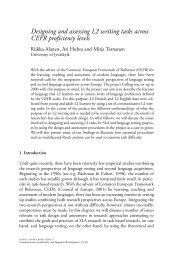BOOK OF ABSTRACTS - EUROSLA
BOOK OF ABSTRACTS - EUROSLA
BOOK OF ABSTRACTS - EUROSLA
You also want an ePaper? Increase the reach of your titles
YUMPU automatically turns print PDFs into web optimized ePapers that Google loves.
Hudson Kam, Carla L. & Elissa L. Newport (2009): Getting it right by getting it<br />
wrong: When learners change languages. Cognitive Psychology 59: 30–66.<br />
Li, Xiaoshi (2010): Sociolinguistic Variation in the Speech of Learners of Chinese<br />
as a Second Language. Language Learning 60(2): 366–408.<br />
Rehner, Katherine, Raymond Mougeon & Terry Nadasdi (2003). The learning of<br />
sociolinguistic variation by advanced FSL learners: The case of nous versus on<br />
in immersion French. Studies in Second Language Acquisition 25: 127–156.<br />
Romaine, Suzanne (2004): Variation. In: Doughty, Catherine & Michael H. Long<br />
(eds.): The Handbook of Second Language Acquisition. Malden, Mass:<br />
Blackwell, 409–435.<br />
Against the Threshold Hypothesis in the Study Abroad Context:<br />
Evidence from Two Different Proficiency Levels<br />
Asunción Martínez-Arbelaiz 1 and Isabel Pereira 2<br />
1 2<br />
Universidad del País Vasco, New York University in Madrid<br />
Study abroad experience has been reported to exert little influence on<br />
students’ grammatical accuracy, which may improve less than in the foreign<br />
language classroom (Collentine, 2004). This general conclusion has been<br />
challenged by different studies (e.g. Howard 2001, 2005 on French past<br />
tenses or Isabelli and Nishida, 2005 on Spanish subjunctive) with advanced<br />
learners (two years of L2 study). On this basis, Lafford (2006) posits the<br />
Threshold Hypothesis, suggesting that it is not until the third year of the L2<br />
study that learners can start paying attention to form. More recent studies<br />
also have shown evidence of the advantage of advanced study abroad<br />
students over their home counterparts on the accurate use of verbal<br />
morphology and subjunctive mood in French (Howard 2006, 2008<br />
respectively) and on the acquisition of the imperfect tense in Spanish<br />
(Martínez-Arbelaiz and Pereira, 2008). Collentine (2009) states that there is<br />
a consensus in research literature that the students may begin a study abroad<br />
program too early in their language development without having reached<br />
enough metalinguistic knowledge.<br />
In order to test the Threshold Hypothesis, we compared the use of the<br />
imperfect tense in semi-spontaneous narrations. Twenty-eight study abroad<br />
and 33 at home students at the intermediate level completed two<br />
compositions, following identical instructions at the beginning and at the end<br />
of the semester; as well as 37 study abroad and 21 at home students at the<br />
advanced level. The comparisons of the results showed that students from<br />
both intermediate and advanced levels outperform the foreign language<br />
learners in their use of the imperfect tense for descriptions. The results stated<br />
that the use of the imperfect can significantly improve as a consequence of<br />
the study abroad experience which leads us to conclude that the Threshold<br />
Hypothesis needs to be tempered with more empirical research.<br />
21



